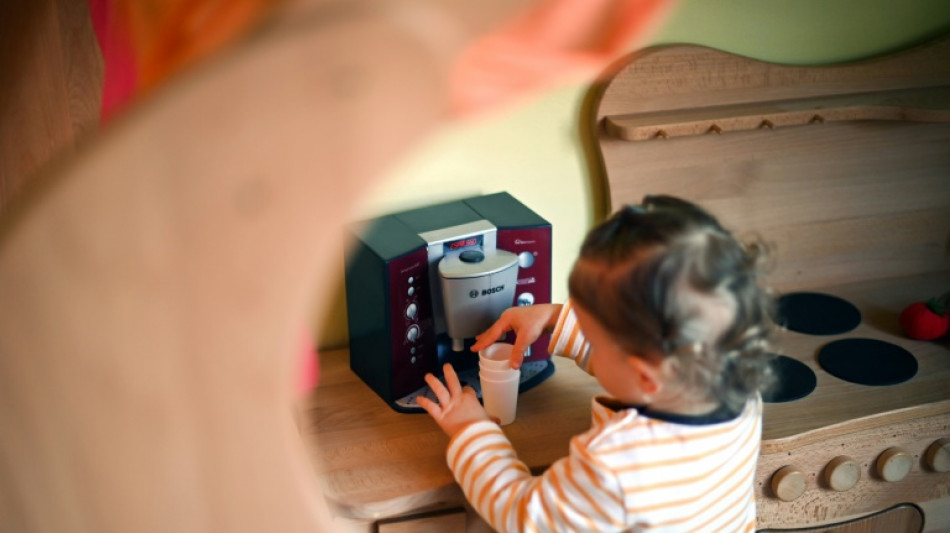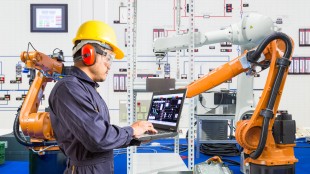
-
 South Korea outclass Iran in Asian Women's Cup opener
South Korea outclass Iran in Asian Women's Cup opener
-
Liverpool's Slot says his 'football heart' does not like set-piece trend

-
 Israel aims fresh attack at Tehran: latest developments in US-Iran war
Israel aims fresh attack at Tehran: latest developments in US-Iran war
-
Energy prices soar, stock markets slide on Iran war fallout

-
 'No indication' Iran nuclear installations hit: IAEA
'No indication' Iran nuclear installations hit: IAEA
-
Showdown looms between Tesla and German union

-
 Israel vows intensified attacks: latest developments in US-Iran war
Israel vows intensified attacks: latest developments in US-Iran war
-
France arrests activists blocking ship over alleged Russia uranium links

-
 Tech sovereignty and AI networks set to dominate mobile meet
Tech sovereignty and AI networks set to dominate mobile meet
-
Indian police clash with pro-Khamenei protesters in Kashmir

-
 Israel targets Hezbollah, Iran: latest developments in US-Iran war
Israel targets Hezbollah, Iran: latest developments in US-Iran war
-
Canada and India strike agreements on rare earth, uranium

-
 A rough guide to F1 rule changes for 2026
A rough guide to F1 rule changes for 2026
-
At least 25 killed at Pakistan's pro-Iran weekend protests

-
 Israel kills 31 in Lebanon, vows to expand strikes after Hezbollah fire
Israel kills 31 in Lebanon, vows to expand strikes after Hezbollah fire
-
Myanmar grants amnesty to over 7,000 convicted of 'terrorist group' support

-
 Riyadh's King Fahd stadium to host 2027 Asian Cup final
Riyadh's King Fahd stadium to host 2027 Asian Cup final
-
'Superman Sanju' toast of India after T20 World Cup heroics

-
 Travel chaos, but F1 season-opener in Australia 'ready to go'
Travel chaos, but F1 season-opener in Australia 'ready to go'
-
Lunar New Year heartache for Chinese team at Women's Asian Cup

-
 El Nino may return in 2026 and make planet even hotter
El Nino may return in 2026 and make planet even hotter
-
Somaliland's Israel deal could put Berbera port at risk

-
 Texas primaries launch midterm battle with Trump agenda at stake
Texas primaries launch midterm battle with Trump agenda at stake
-
How a Syrian refugee chef met Britain's King Charles

-
 Bangladesh tackle gender barriers to reach Women's Asian Cup
Bangladesh tackle gender barriers to reach Women's Asian Cup
-
Argentina's Milei says wants US 'strategic alliance' to be state policy

-
 'Sinners' wins top prize at Screen Actors Guild awards
'Sinners' wins top prize at Screen Actors Guild awards
-
New rules, same old suspects as F1 revs up for 2026 season

-
 World Cup tickets: Huge demand and sky-high prices
World Cup tickets: Huge demand and sky-high prices
-
List of key Actor Award winners

-
 Trump hunkers down after Iran strikes
Trump hunkers down after Iran strikes
-
China's leaders gather for key strategy session as challenges grow

-
 UK toughens asylum rules to discourage migration
UK toughens asylum rules to discourage migration
-
Israel hits Lebanon after Hezbollah fire, expanding Iran war

-
 CBS in turmoil as US media feels pressure under Trump
CBS in turmoil as US media feels pressure under Trump
-
Messi bags double as Miami battle back to down Orlando

-
 Greenland is 'open for business' -- kind of, says business leader
Greenland is 'open for business' -- kind of, says business leader
-
Canada's Carney to mend rift, boost trade as he meets India's Modi

-
 Crude soars, stocks drop after US strikes on Iran
Crude soars, stocks drop after US strikes on Iran
-
Iran war spreads across region as US, Israel suffer losses

-
 Miriam Margolyes tackles aging in Oscar-nominated short
Miriam Margolyes tackles aging in Oscar-nominated short
-
Recognition, not competition, for Oscar-nominated foreign filmmakers

-
 Israel, Hezbollah trade fire: latest developments in Iran war
Israel, Hezbollah trade fire: latest developments in Iran war
-
Israel strikes Tehran: latest developments in Iran war

-
 Trump vows to avenge first US deaths as Iran war intensifies
Trump vows to avenge first US deaths as Iran war intensifies
-
Habi Acquires Pulppo to Expand Leadership in Latin America's Residential Real Estate Market

-
 Who Is the Best Plastic Surgeon in Bellevue?
Who Is the Best Plastic Surgeon in Bellevue?
-
vMOX Merges with Advantage Communications Group

-
 Who Does the Cheapest Breast Augmentation in Florida?
Who Does the Cheapest Breast Augmentation in Florida?
-
MWC 2026: Amdocs Unveils CES26, an Agent-driven BSS-OSS-Network Suite, powered by the Amdocs aOS Cognitive Core


Infants remember more than you think, new study reveals
Our earliest years are a time of rapid learning, yet we typically cannot recall specific experiences from that period -- a phenomenon known as infantile amnesia.
A new study published in Science on Thursday challenges assumptions about infant memory, showing that young minds do indeed form memories. The question remains, however, why these memories become difficult to retrieve later in life.
"I've always been fascinated by this mysterious blank spot we have in our personal history," Nick Turk-Browne, professor of psychology at Yale and the study's senior author, told AFP.
Around the age of one, children become extraordinary learners -- acquiring language, walking, recognizing objects, understanding social bonds, and more. "Yet we remember none of those experiences -- so there's a sort of mismatch between this incredible plasticity and learning ability that we have," he said.
Sigmund Freud, the founder of psychoanalysis, hypothesized that early memories are repressed, though science has since largely dismissed the idea of an active suppression process. Instead, modern theories focus on the hippocampus, a part of the brain critical for episodic memory, which is not fully developed in infancy.
Turk-Browne, however, was intrigued by clues from previous behavioral research. Since babies cannot verbally report memories before acquiring language, their tendency to gaze longer at familiar things provides important hints.
Recent rodent studies monitoring brain activity have also shown that engrams -- patterns of cells that store memories -- form in the infant hippocampus but become inaccessible over time -- though they can be artificially reawakened through a technique that uses light to stimulate neurons.
But until now, pairing observations of infants with brain imaging had been out of reach, as babies are famously uncooperative when it comes to sitting still inside a Functional Magnetic Resonance Imaging (fMRI) machine -- the device that tracks blood flow to "see" brain activity.
- Psychedelic patterns -
To overcome this challenge, Turk-Browne's team used methods his lab has refined over the years -- working with families to incorporate pacifiers, blankets, and stuffed animals; holding babies still with pillows; and using psychedelic background patterns to keep them engaged.
Still, inevitable wiggling led to blurry images that had to be discarded, but the team accounted for this by running hundreds of sessions.
In total, 26 infants participated -- half under a year old, half over -- while their brains were scanned during a memory task adapted from adult studies.
First, they were shown images of faces, scenes, or objects. Later, after viewing other images, they were presented with a previously seen image alongside a new one.
"We quantify how much time they spend looking at the old thing they've seen before, and that's a measure of their memory for that image," said Turk-Browne.
By comparing brain activity during successful memory formation versus forgotten images, the researchers confirmed that the hippocampus is active in memory encoding from a young age.
This was true for 11 of 13 infants over a year old but not for those under one. They also found that babies who performed best on memory tasks showed greater hippocampal activity.
"What we can conclude accurately from our study is that infants have the capacity to encode episodic memories in the hippocampus starting around one year of age," said Turk-Browne.
- Forgotten Memories -
"The ingenuity of their experimental approach should not be understated," researchers Adam Ramsaran and Paul Frankland wrote in an accompanying Science editorial.
But what remains unresolved is what happens to these early memories. Perhaps they are never fully consolidated into long-term storage -- or perhaps they persist but become inaccessible.
Turk-Browne suspects the latter and is now leading a new study testing whether infants, toddlers, and children can recognize video clips recorded from their own perspective as younger babies.
Early, tentative results suggest these memories might persist until around age three before fading. Turk-Browne is particularly intrigued by the possibility that such fragments could one day be reactivated later in life.
O.Karlsson--AMWN